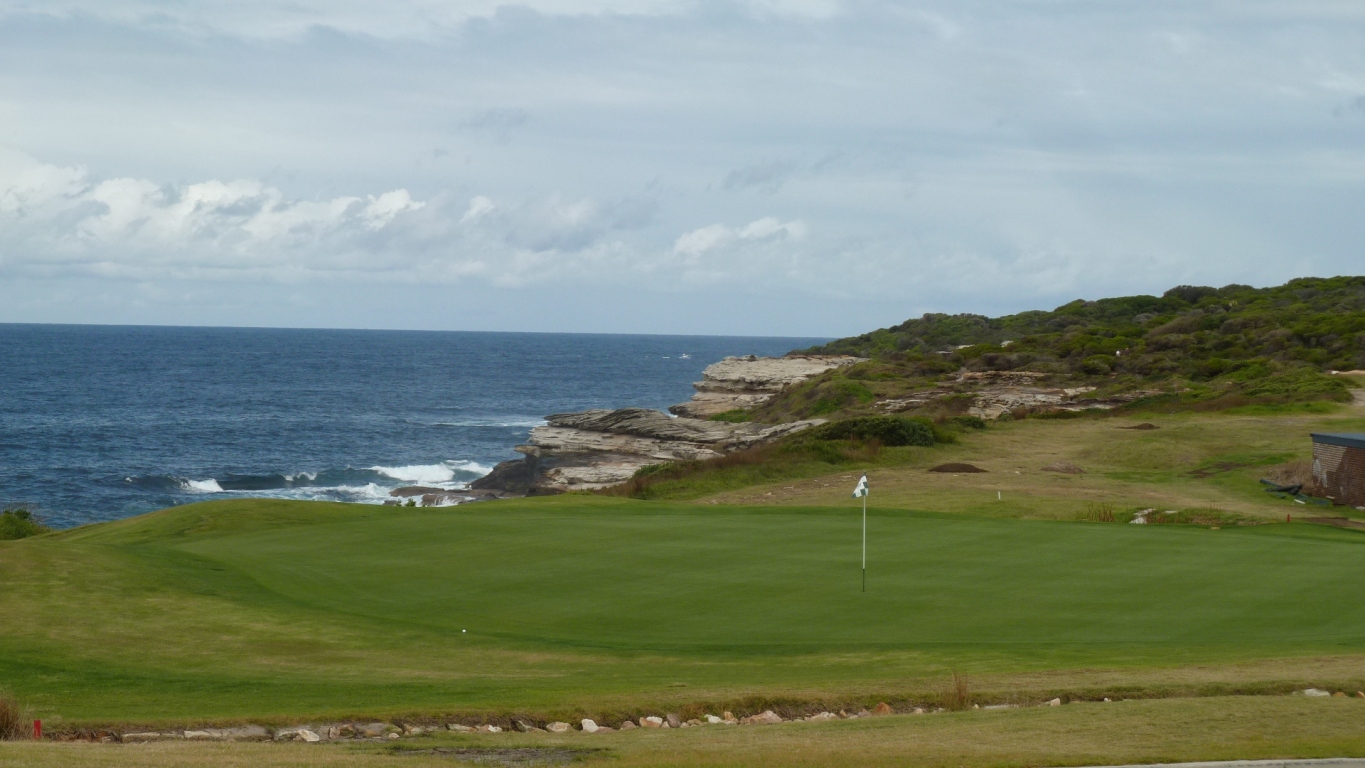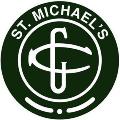
Location: Little Bay, NSW
Established: 1938
Architect: Michael Moran & C.W. Cole
First Played: 9th Jan 2013
Last Played: 25th Apr 2014
Magazine Ratings

60 (Current)

61 (Current)

60 (Current)
What better way to spend a public holiday playing one of the Top 100 courses. In this case it was St Michael’s Golf Club located in the Little Bay, across town. A fellow work employee (Michael) who took up the game in the last year was keen also to play a different course to his home club, so we set out to take advantage of the great weather.
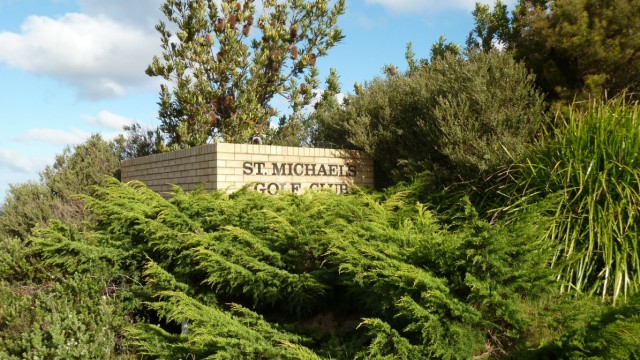
After a drive across town, finally arriving to St Michael’s Golf Club
One thing that stands out when you arrive is the great view beyond the clubhouse. From this position you see out over the course and take in the view of the Tasman Sea. Enjoy a drink and relax in preparation before the game or take in a meal and ale watching groups complete their front nine.
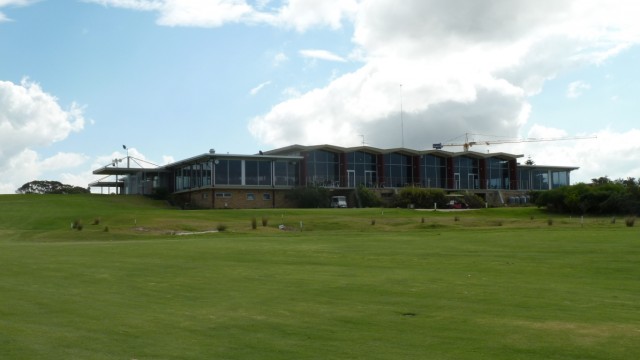
The clubhouse at St Michaels GC overlooks the course and ocean
St Michael’s has good facilities, ranging from the guests locker room, to practice facilities around the clubhouse. There is a putting green where you can familiarise yourself with green speeds, whilst a chipping green can be found below, both having great views over the bottom section of the course. Alternatively there is a driving range that is adjacent to the club to get your swing grove, which operates separately from the club.
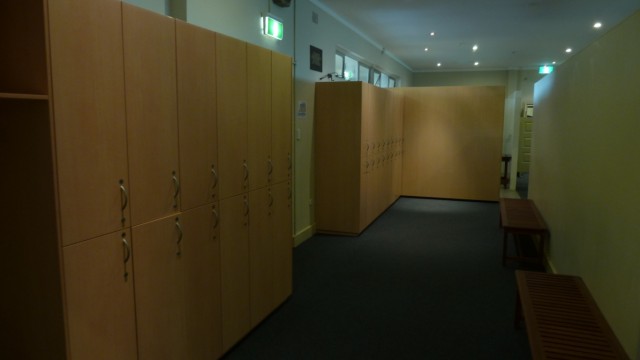
The Mens visitor locker room has all the required facilities for your visit
St Michael’s Golf Club eventuated out of the founding of a social club in 1932 called “The Niblick Club”. This aimed at allowing social intercourse between the Catholic community. After finding it difficult to play at other courses as they became more popular, land was found between NSW GC and Prince Henry Hospital. The land was cleared of scrub and the course first 9 holes opened in 1938.
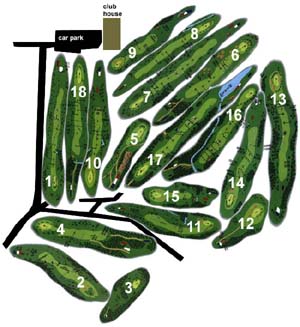
Map of St Michaels Golf Course
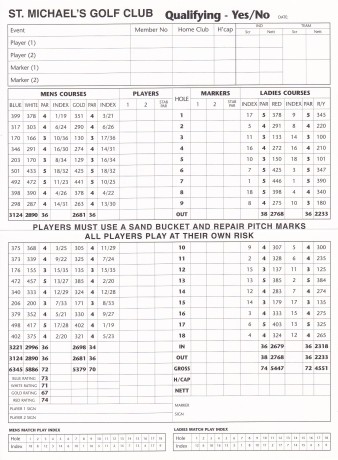
Scorecard for St Michaels Golf Club
A short stroll from the clubhouse will bring you to the first tee. Nothing like a challenge on the first hole, facing a 399 meter par 4, ranking as the hardest hole on the course. The aim is to land on a plateau located more to the right which acts as the main part of the fairway leading to the hole. Too far left will make the second a little more difficult with trees blocking the shot.
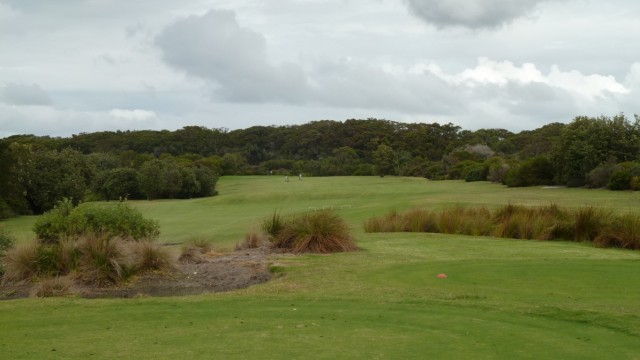
From the first tee you face the hardest hole on the course
Playing into the hole can be tricky if you have found some of the steep slopes in the middle of the fairway, but if you manage to find the green things should be relatively easy. It is a medium sized green sloping back to front. There are a few mounds surrounding the green, but overall not much strategy to this hole, just hit long and straight.
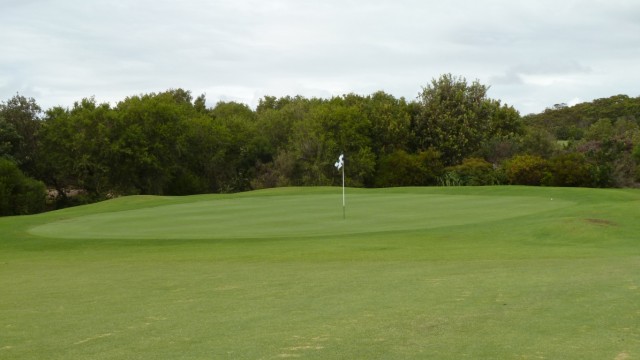
Fairly flat green on the 1st green. Finding it should lead to par
You cross a public road to reach the next 3 holes which are bordering parts of NSW GC. The second is a tricky par 4 measuring only 317 meters. From the tee you can only see a small portion of the fairway and most of this is a steep slope. The hole turns to the right, so you can attack by hitting over the trees, but getting the line right can be tricky, possibly leading to a lost ball.
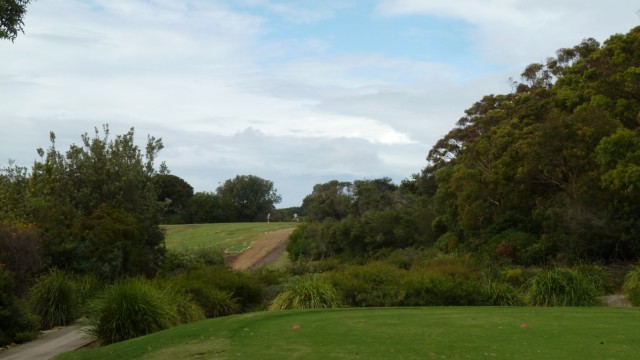
Tight blind tee shot from the 2nd hole
The approach to the green once you reach the hill from the tee is about 140 meters. Hitting too long also leads to a blind shot to the tee as trees are located on the left, as the fairway narrows towards the hole. There are three bunkers guarding the front and one at the rear of the putting surface, which has a few slopes and turns. A lot more tricky than the first green. A good strategic hole leaving you in two minds at the tee, but the disappointing think was the state of the fairway. Many bare patches could be found on the second which really need to be addressed.
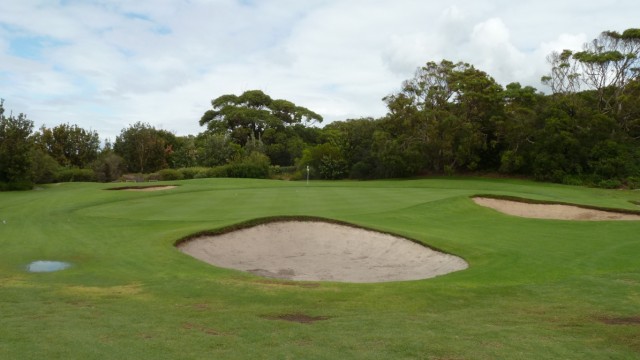
Signs of the state of the fairway are shown here with small bare patches evident
The 3rd hole, a 170 meter par 3, is a shot across a valley. Hitting from a hill on one side, you can just see the putting surface on the other side of the valley. It is quite a scenic hole but also slightly intimidating. For the really badly hit shot, scrub and sand can be found at the bottom of the valley. Anything short of the green will be an uphill shot. Left is a large hill leading to the next tee, but leaving a tricky second.
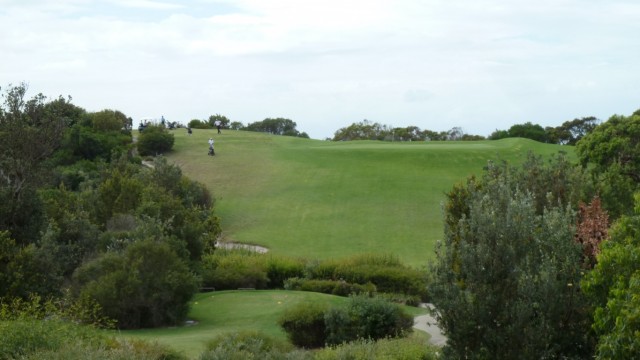
Hole 3 is an uphill shot of 170 meters to the green
The green is long and narrows as you go towards the back. From here we have a great view of NSW GC, especially the 16th green and some of the famous pot bunkers on the course. We had some Canadian visitors playing behind us who were enthralled with the view.
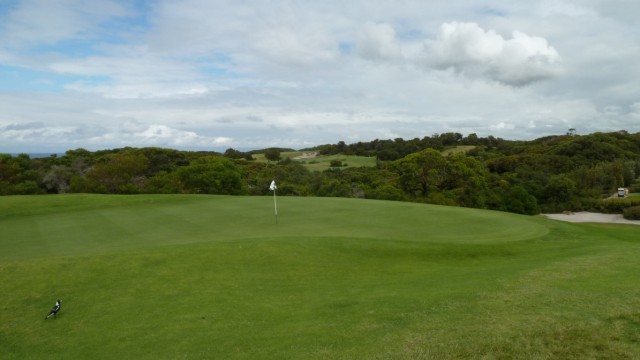
The 3rd green with NSW GC in the background
From the 4th tee you have a great view out over the St Michaels course, but also The Coast GC next door and the coastline leading back towards the city. This tee shot, basically is blind to the fairway, sitting far below. This 346 meter par 4 plays much shorter due to the raised tee. Best to walk up to the front of the tee box to observe what is below. Easy to not see the water hazard out to the right in what looks to be a wide open fairway. Hitting an easy long iron here is a good option to keep out of trouble.
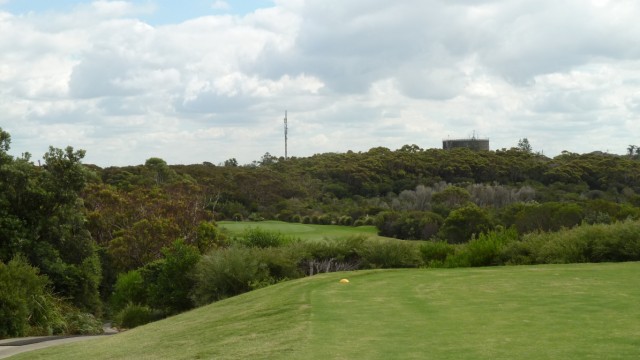
Only the green can be seen from the 4th tee
Many mounds can be found front left and right of the green, with a small entrance between. These actually look out of place compared to the rest of the terrain, which is basically dead flat. The putting surface itself has a small false front, but is fairly flat. If you find the green in two, you should walk off with an easy par.
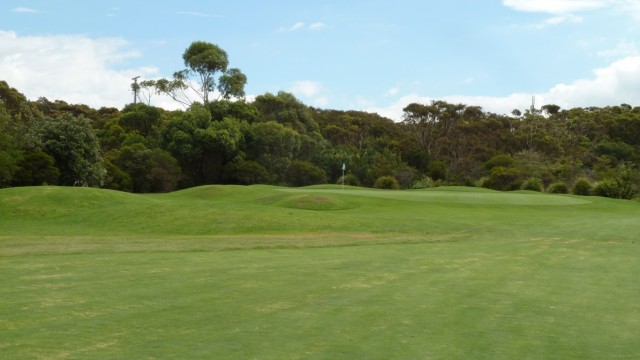
Numerous mounds surround the 4th green but don’t suit the surrounds
Heading back to the main part of the course, we cross back across the road. There is a bit of a maze getting to the 5th hole, but when you do get there we are presented with a narrow chute to reach the green. This hole is a mammoth at 203 meters for a par 3. Between the chute is sandy waste. It looks an extremely tight shot but is deceiving.
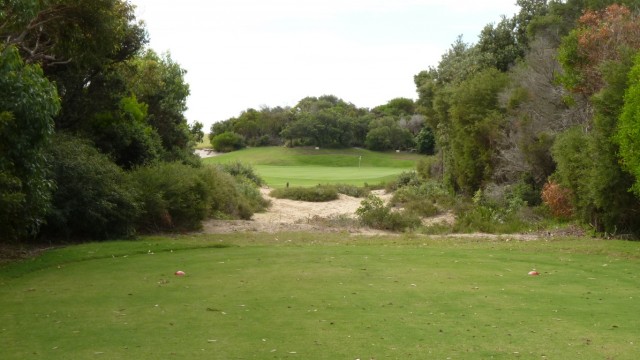
Hit through a narrow shoot from the 5th tee
Michael playing his tee shot on the 5th
When we get to the green you can see it opens up quite a lot, although to the left is a lot of sand. For anything a little short or right there is space to land safely, although from the right the second shot could be a little testing as the green is raised. This hole narrows as you go from the front to back of the green. There is also a large mound back left, making shots to a back pin a little trickier.
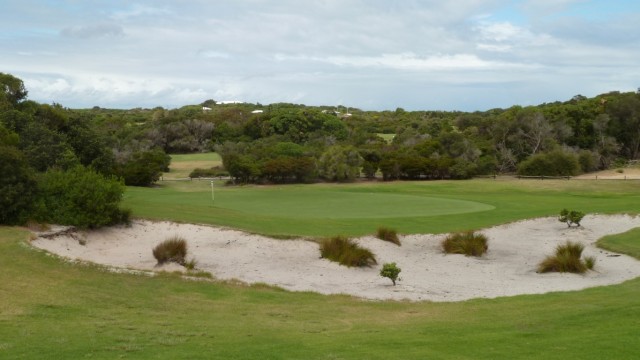
Open area surrounds the 5th green
We now head to the open areas of the course, towards the sea. The 6th, a 501 meter par 5, is played from a raised tee, but with a head wind, this hole will play its full distance and more. An errant tee shot will find trouble from the tee with trees and water right, sandy waste down the left.
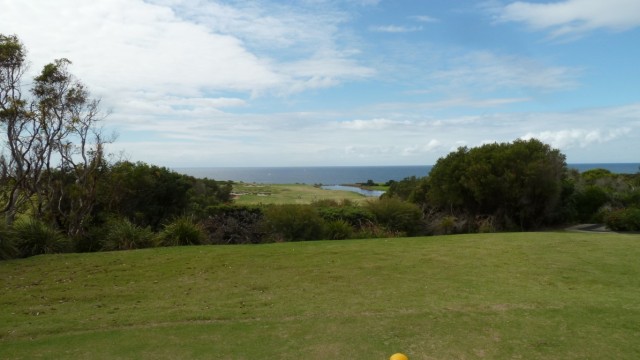
Danger can be found from the 6th tee with an errant shot
These new sandy waste areas were out of play on my visit, but will make this hole a bit more interesting in the future. Certainly better than having small shrubs separating the 6th and 7th holes. Unfortunately my playing partner did not realise that the ground was GUR and took two shots to get out. Lucky for me I say, he is a burglar.
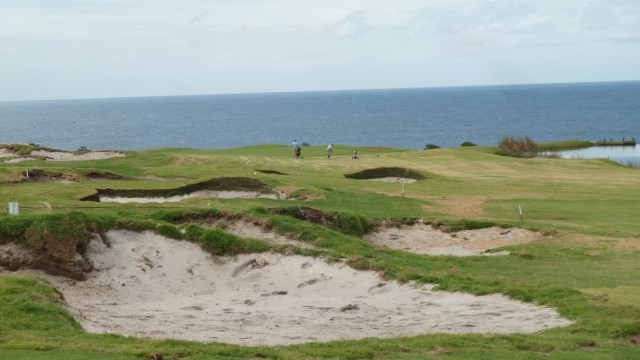
New waste areas or scattered bunkers being put in place down the left of the 6th fairway
Its great scenery playing to the green, with the sea as a back drop. Take in the views as you walk down towards the green, not just of nature but also the golf course. A water hazard also runs along the left as we get closer to the hole, all full of stones, so you won’t be playing a shot out of them. The fairway drops down just in front of the green, giving a little bit of extra run, but putting surface slopes from back to front, and left to right. Anything long equals danger here and a difficult shot back.
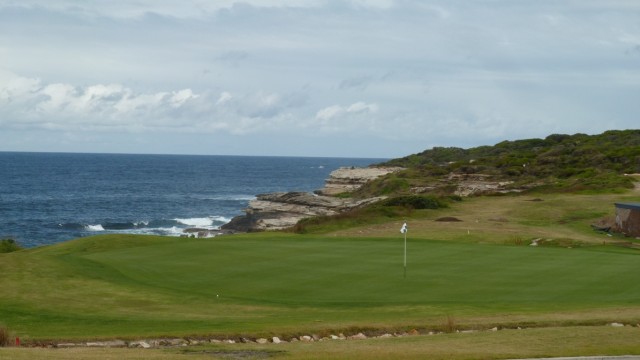
Great views can be found beyond the 6th green
Heading back up the hill, we play the 7th, a 492 meter par 5. This hole plays every meter of its distance. Visually from the tee it is quite wide open fairway, with the main danger from the tee being sandy waste located on the left, separating the 7th and 6th hole. I did find the fairway to have some bad bare patches, but also quite saturated and a bit bogey in places. There had been rain before we arrived, but I don’t believe it was enough to cause these issues.
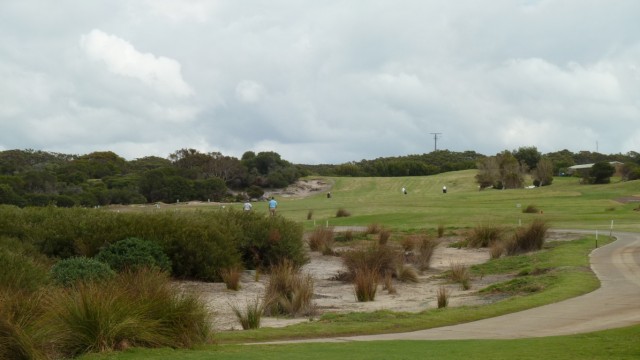
The second par 5 in a row is found on the 7th
As we get closer to the green the fairway narrows quite dramatically. A new sandy waste area is being built on the left of the fairway, which I feel is a positive change, replacing tee tree which encroached on the fairway. Playing the second shot can be quite deceiving, with the green appearing to be raised on a plateau. However this is not the case and you play over a hill, with a small valley found after this before reaching the green.
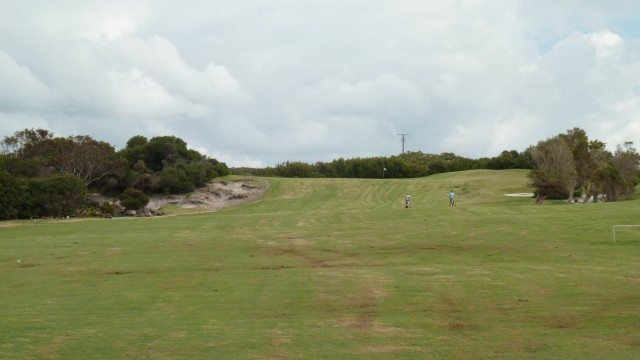
New waste area being put in place beside the 7th fairway
Playing to this long narrow green, play towards to the right of the fairway, to ensure you hit the green. The front and left has a sharp drop off from the green, whilst to the right there is a large mound. Playing long is not an option as trees will come into play. The green slopes back to front and slight right to left slope, but is predominantly flat, so reaching the green in regulation should lead to a well deserved par. You have a great view from here of the fifth green and how much open space exists around the hole, a stark contract from that of the tee.
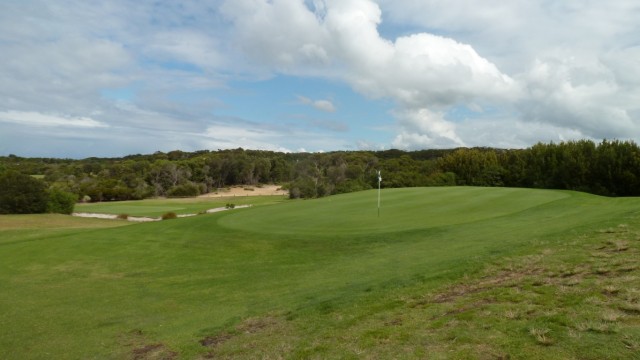
The raised 7th green has a large slope away on the left
From the 8th, we again play back towards the sea, from a raised tee. This 398 meter par 4 has a fairway which is quite expansive, with plenty of room to land your drive. Being too far left could led to a difficult shot, sandy waste and shrubs are located down this side.
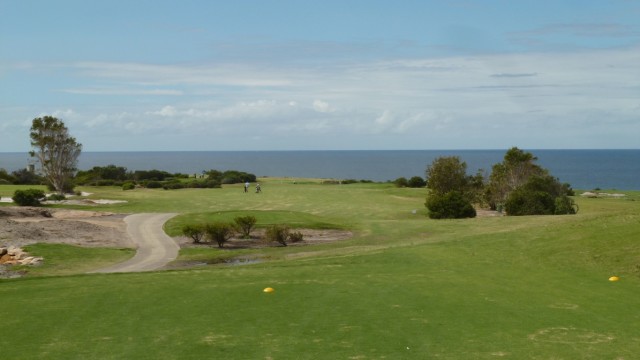
Playing down the hill to the 8th
The green has a significant slope down from the fairway, so balls landing short have the chance to run on. One other great aspect is the grass being quite firm allowing you to run the ball in if necessary. A few small undulations can be found on the putting surface, so dependent on the pin position, could leave some tricky putts.
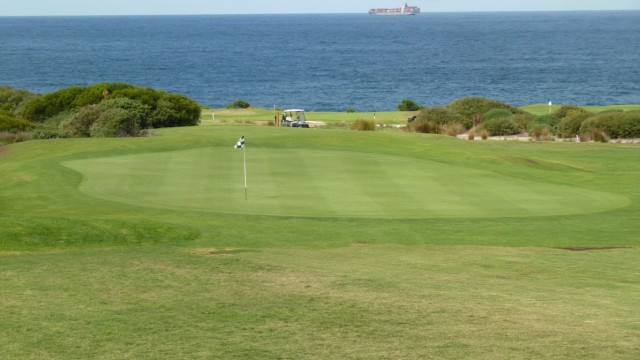
Green 8 slopes back to front and right to left, but hides behind a mound
Finishing the outward journey, is the short 298 meter par 4. Playing back up the hill towards the clubhouse, you must be accurate with the tee shot, especially using longer clubs. Sandy waste exists on the left of the fairway, with new large waste areas being created on the right. At around the 200 meter mark the fairway narrows significantly, so driver off the tee makes this a great risk reward hole.
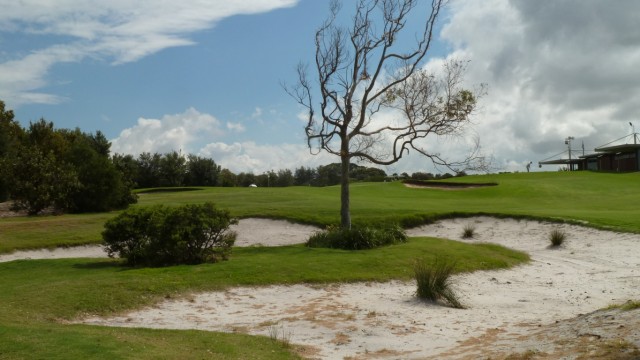
Sandy waste can be found both left and right of the 9th fairway
The second shot to the green, if you haven’t reached it with the drive, is to a green perched atop a small ridge. This leaves a difficult judge of distance as the bottom of the flag cannot be seen. Four bunkers also protect the sides of the green, but there is a bit of room right or long, leaving some small mounds to be dealt with to get back to the putting surface.
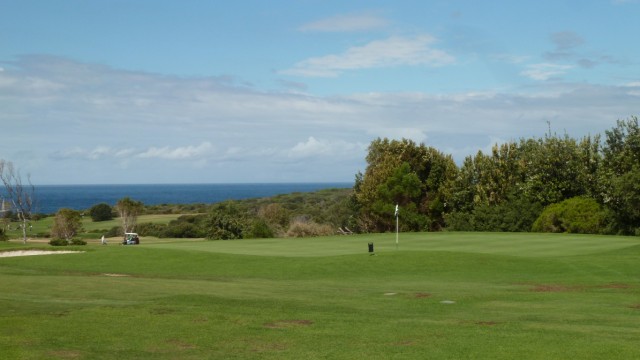
The 9th green sits atop the hills next to the clubhouse
To give you a feel for the overall look of the course I have included what the hole markers and pin flags look like at St Michaels.
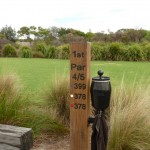
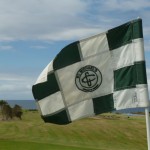
Typical tee markers and pin flags of St Michaels Golf Club
Starting the back nine is a fairly straight par 4 measuring 375 meters. From the tee this looks tight, but you hit downhill and once down the gully the fairway opens up quite a bit. Sandy waste exists on the right, however this appears to have become quite hard and compact since I last played.
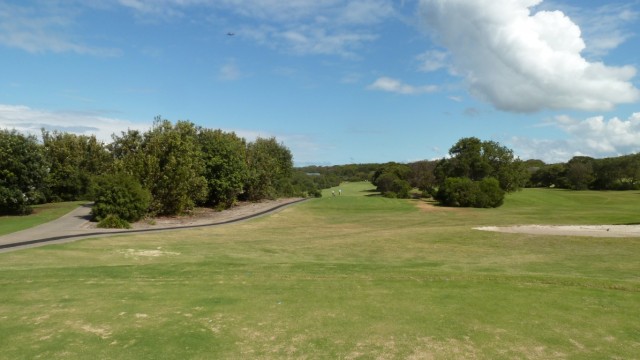
The 10th fairway opens up quite wide beyond the trees
Playing you second should be uphill to the green, with one bunker protecting the right side. The surface is fairly flat sloping back to front.
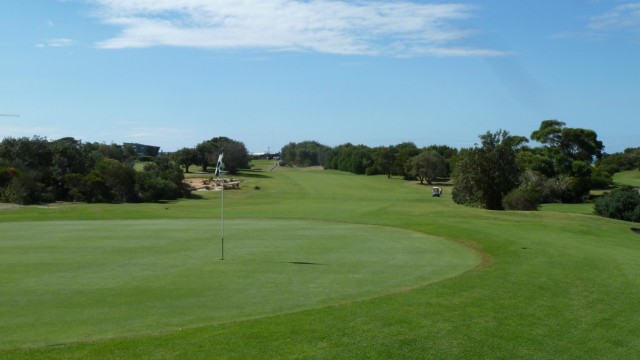
Play up the hill to the 10th green
Probably the most unique hole at St Michaels Golf Club is the eleventh. At 373 meters par 4 can be played in numerous ways as the shape of the design is almost like a question mark (think of the irony as you decide how to play). There is the straight down the middle approach, which will leave a second shot across bush, but requires accurate club selection. The second alternate is playing over the trees on the right to shorten the hole and leaving a clear shot to the green.
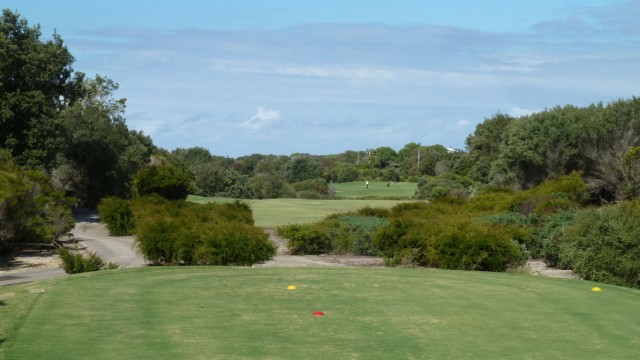
An intimidating tee shot which requires some local knowledge on the 11th
We can see from the photo danger exists for the big hitters if going straight down the fairway. Three bunkers help to stop some lost balls in the scrub, but leave a very difficult second shot. There is an opening in which to shoot through, to this green sitting above the fairway is guarded by one lonely bunker, but anything long could find the bush. Some gentle slopes and undulations can be found on the putting surface leading to some difficult putts.
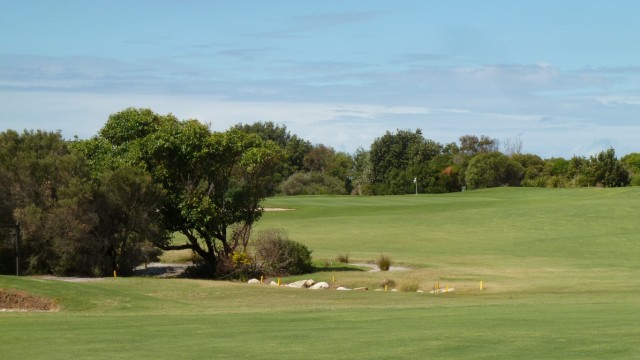
The 11th presents a carry over scrub from either the tee or the second shot
From the tee the 12th hole looks intimidating but quite scenic with the sea being seen in the background. This 176 meter par 3 is not only long but protected by numerous bunkers front and along the left. Into the sea breeze this becomes a much longer hole.
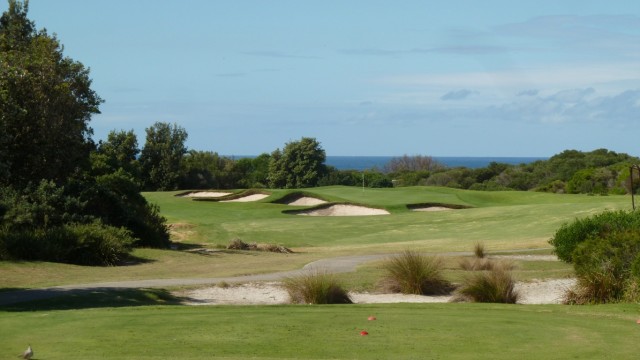
The 12th, a medium length par 3 requires all carry to hit the green
You can bail out right, but face a chip into a swale, long is not an option as this green slopes dramatically from the back to front, leaving any shot above the hole with a slippery chip or putt.
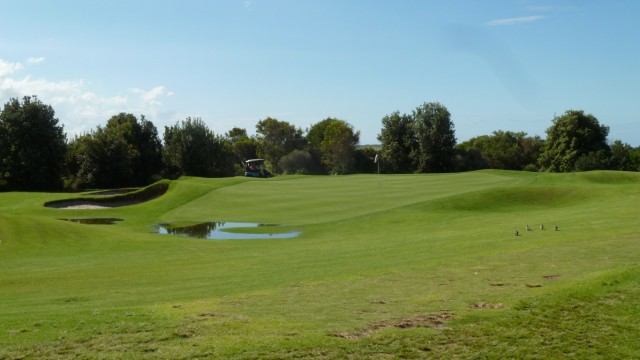
A large sloping green surrounded by bunkers and swales on the 12th
Playing our last hole down along the coast, the 13th par 5 is 372 meters. From the tee you must carry some scrub, but it is more the width of the fairway that becomes an issue. Best to miss left here as a water hazard runs the length of the hole, where as right will result in a lost ball. Hitting the fairway should result in a bit of extra run as the fairway runs away from you. Great visually from the tee but certainly open to the elements.
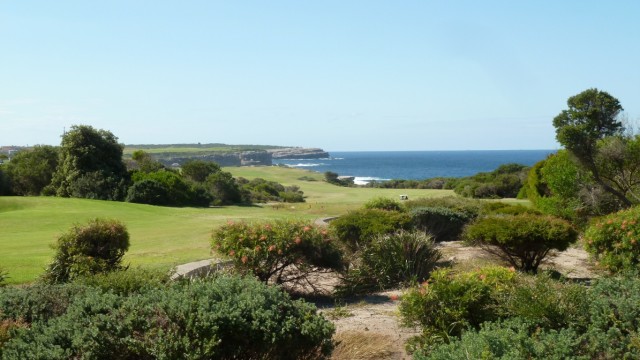
Play straight down the middle on the 13th par 5
Michael find the hazard left, but had this almost impossible shot with the ball a foot below his feet when playing. He managed the impossible and got the shot 100 meters down the fairway.
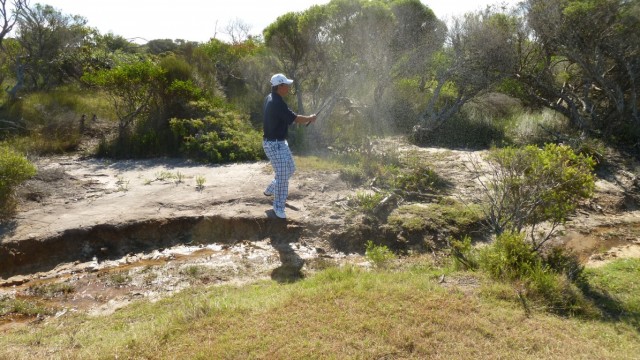
Playing partner Michael makes a remarkable shot out of the hazard
As we approach the green the area opens up from about the 100 meter mark. We see the putting surface is raised with run off in all directions. Two traps protect the left side with one located right. This large green is fairly flat, which is understandable with it being close to the water. If you miss the green there is the option to bump and run the ball on as the grass is a lot shorter and ground firmer, one of the things I love about links golf.
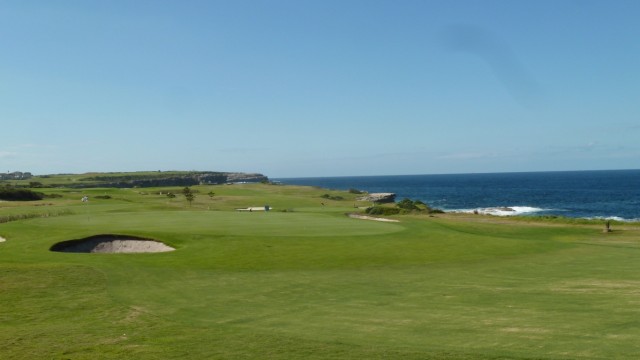
The 13th green overlooks the sea, not so good in gale winds
From the 14th we head away from the sea and back into the tree lined area of the course. This par 4 measuring 340 meters, has a gentle turn to the right. From the tee you carry a small amount of scrub and will carry a few small hills. An assortment of bunkers on the right are in play from the tee, but this line also helps to shorten the hole.
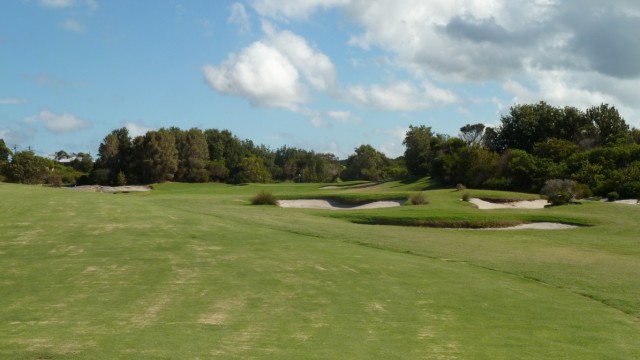
Fairway traps protect the 14th fairway
As you approach the green, we see waste to the left, then treeline running and almost surrounding the hole, whilst the front right has one trap. The green is raised at the front to repel balls falling short, with small mounds at the rear will assist in keeping the ball on.
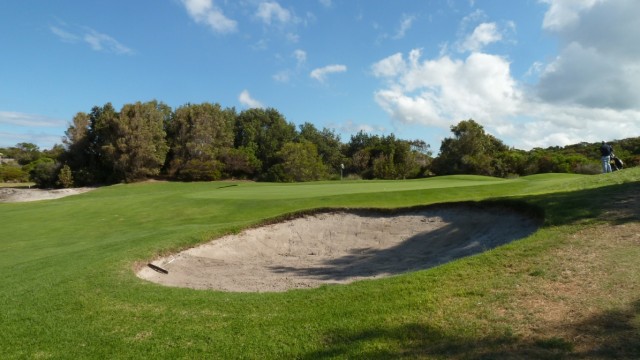
Green 14 sits above the fairway and has waste and bunkers either side
Coming to the 15th we have a long par 3, measuring 206 meters. This hole plays from an elevated tee and has a lot of landing area before the hole, but you must carry the trees to reach this.
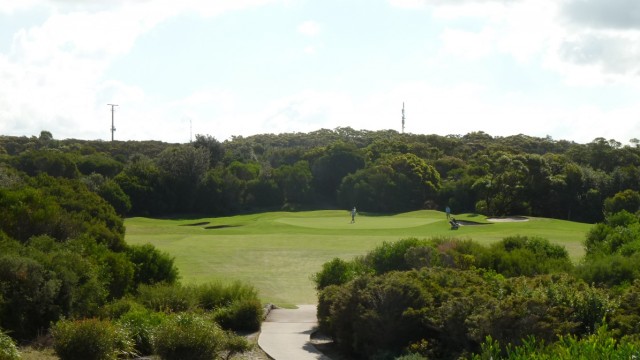
A tough tee shot to the long 15th par 3 hole
The green is fairly large, as it should be for such a long hole, but is well protected on each side of the green with 5 bunkers in total. Large mounds protect the rear, but also assist the player to some degree, as they will slow a ball running a bit hot from reaching the trees. The putting surface is quite long and has a bit of width so you could have some long putts on this green.
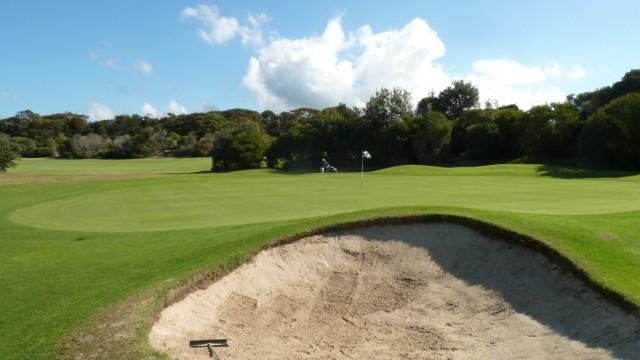
Multiple bunkers catch the errant tee shot on the 15th
The 16th hole is a 379 meter par 4 which dog legs to the left. This is no doubt the most intimidating tee shot on the course, with at least 100 meters to carry over heavily wooded area (this very will could be longer but I didn’t measure how far the carry is). We also are blind to how much the hole turns left, so if trying to cut the dog leg you must know the line to take.
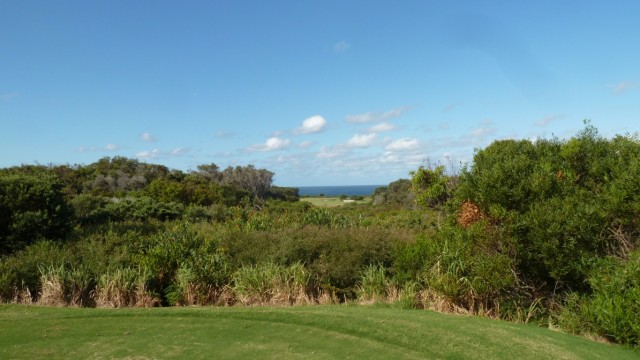
The 16th is a difficult tee shot with a 100 meter carry over scrub (long hitters ignore)
Numerous hills are found on the way to the hole, with the chances of the tee shot finding its way to the bottom of the gully. This leads to a blind shot to the green. One large tree is short right of the green, so we stay to the left of this. The green slopes from right to left, running down to the water hazard.
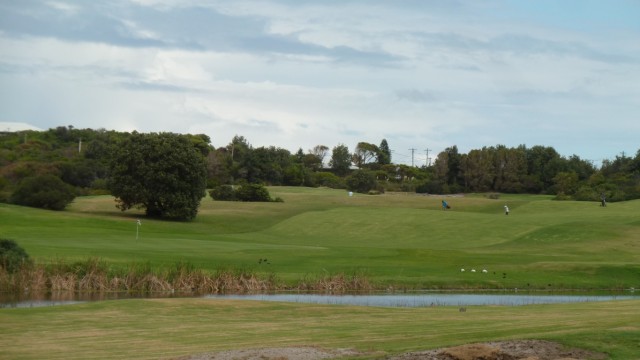
Most people will have a blind tee shot to the 16th green from the gully
Another tough tee shot is found on the 17th, a par 5 at 498 meters. On our day of play the tee was forward so it was a short par 5 at 411 meters, but still presented problems if you mishit. You must carry scrub and water before reaching the fairway. When from the forward tees if the large hill can be carried, it will make the approach much easier, else the shot from the fairway will be a blind one. Luckily the fairway is quite generous in width, but trees run the entire length of the hole.
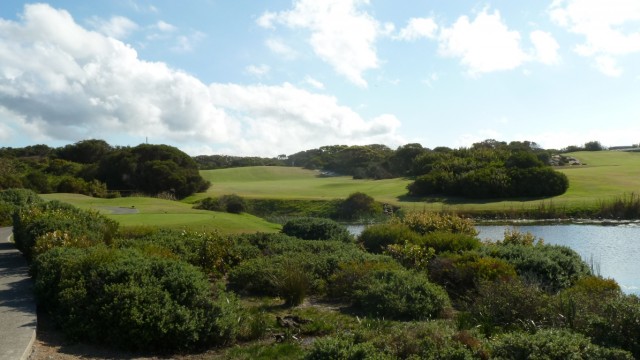
Hole 17 plays with your mind from the tee
As you get closer to the green the fairway narrows significantly, making the second or third shot a little more difficult. The best angle is from the left, taking some of the sandy waste and trees out of play located right. This green is quite long and widens towards the rear. The green also has a few slopes in differing directions, whilst the surrounds all run away from the putting surface.
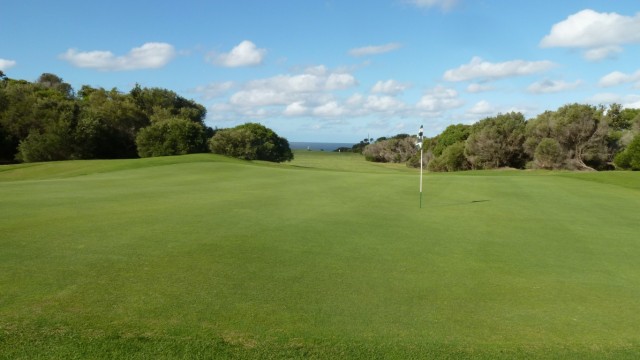
17th green is fairly long allowing approach shots to run out
Passing many of the previously played holes, we get to the 18th, a par 4 measuring 402 meters. Quite ironic we start and finish on the hardest holes of the course, which run side by side. This hole plays uphill to the green with trees scattered along either side. These are not as dense as the rest of the course so you are unlikely to loose your ball. Waste areas also exist along part of the right side of the fairway, separating the 18th and 10th.
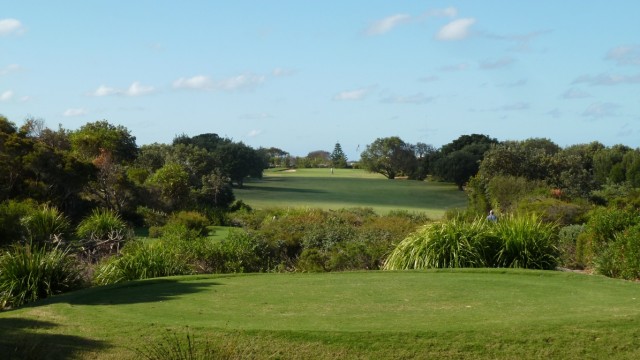
The 18th tee plays to a widish fairway
I luckily managed to tie my partner on the 18th after giving up a big lead going into the back 9. Great way to finish the round. Michael managed to find the trees on the left of the green, after an errant shot from the middle of the fairway.
Michael throws away the win finding the trees with an errant second shot
The green slopes quite a bit from the rear to the front, with one solitary bunker on the left side. The main defense of the hole is its distance, but par here is well deserved and make the beverage on the 19th taste that much better.
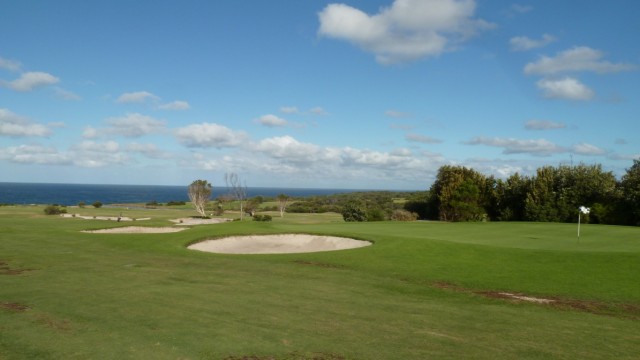
Looking back from the final green, hopefully reflecting on a good round
Overall I would have to rate my visit to St Michaels Golf Club as a great time. The location is hard to beat and the routing which has been taken over the land could not be improved too much. There is a great mixture of holes in varying lengths and variety of strategies. The greens were in good even condition although due for a cut, the ball at times deviated in unusual ways when slowing down, but being the Easter Break this is understandable.
Fairways were generally in good condition on parts of the course, but there were quite a few bare patches on some of the holes, whilst others seemed to be overly saturated. Some maintenance work is being carried out on the course, with some expansive areas of GUR, in particular the 2nd, 6th, 7th & 9th holes with either new turf or constuction of bunker/wasteland areas. I assume this is all in aid of preparing for the upcoming 2014 Australian Golf Digest rankings.
I particularly enjoyed the clubhouse, which was a great place to sit back with an ale and enjoy the views of the course and the Tasman Sea beyond. A course well worth visiting again, although if you know someone next door at NSW Golf Club, don’t hesitate to give that a visit.
Playing at St Michaels Golf Club is an easy process, access to the public at specified times is available. Contact the club or visit their website to see available times.

